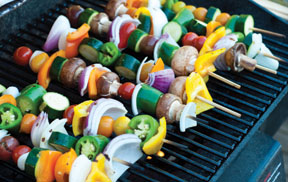| << Back |
Feeling Fit: Safe Grilling for Better Health
By Aly Wagonseller
Throwing a tasty ribeye or rack of ribs onto the backyard barbecue is simply an American institution; especially when local weather is conducive to outdoor cooking nearly 365 days a year. But grilling your meaty meal could be causing more harm to your health than you think. We’re not talking heart disease or high cholesterol here, although they can become a factor if fatty meats are consumed on a daily basis. Rather, this is all about the Big C – Cancer, and the risks are real with every bite you take.
When the combination of protein, intense heat and smoke occurs, substances within meat, chicken and fish form carcinogenic compounds called heterocyclic amines. These compounds, known as HCAs, can actually damage our DNA, allowing for cancer development to start and progress. Most often, these cancers manifest in the colon and stomach, but research suggests that HCAs travel within our systems, causing cancer in other areas of the body, including the breast and prostate regions. Some research even suggests that those who consume large amounts of barbecued red meat such as beef, pork and lamb can double their risk of developing the disease, a meaty fact worth noting. So what can a barbie lover do to reduce the risks and still enjoy a healthy meal off the grill? Hope is in the cooking.
What’s Hot, What’s Not
“Many people enjoy grilling during the summer; however, overcooking meats can actually produce cancer-causing compounds,” says Executive Chef Frank Caputo of Cancer Treatment Centers of America® at Western Regional Medical Center. “We want to share healthy cooking practices for everyone to enjoy.” Caputo, a graduate of the Culinary Institute and a former entrepreneur in the restaurant industry, suggests first seasoning lean meats that include sirloin, flank, tenderloin, veal, poultry and fish with herbs and spices that not only flavor foods but introduce phytochemicals that actually prevent damage of healthy cells. Spices and herbs including cumin, cinnamon and turmeric, as well as cilantro, dill, rosemary and basil are great choices. Incorporating them into marinades along with vitamin C rich citrus juices is a great way to both flavor and tenderize meats. Once you move to the grill, Caputo suggests cooking over low heat, preventing flare-ups at all costs, and avoiding the urge to overcook or burn meats. “Safe temperatures for cooked meats range from 145 degrees for seafood and fish, 160 degrees for ground beef and pork and 170-180 degrees for poultry,” he adds. Other tips to reduce risk include:
- Choose low-fat foods, trim excess fat and incorporate vegetables or kabobs to reduce the chance of HCA formation since fat heated to high temperatures and drip off that creates smoke are major culprits.
- Precook foods in the oven or microwave, finishing on the grill. Research suggests this can reduce HCA formation by 90%.
- Marinate proteins in olive oil and lemon juice-based mixtures. Research shows this reduces the formation of cancer-causing compounds by up to 99% during cooking, while adding flavor and helping to keep foods moist.
- Flip frequently. This may prevent that yummy, caramelized crust we all know and love, but it keeps meat from overheating.
Protecting your family from cancer while enjoying outdoor grilling doesn’t have to be a summer buzzkill. By keeping the flames and smoke at bay and employing a few easy techniques for both cooking and shopping, you’ll be safe, sound, full… and happy!








